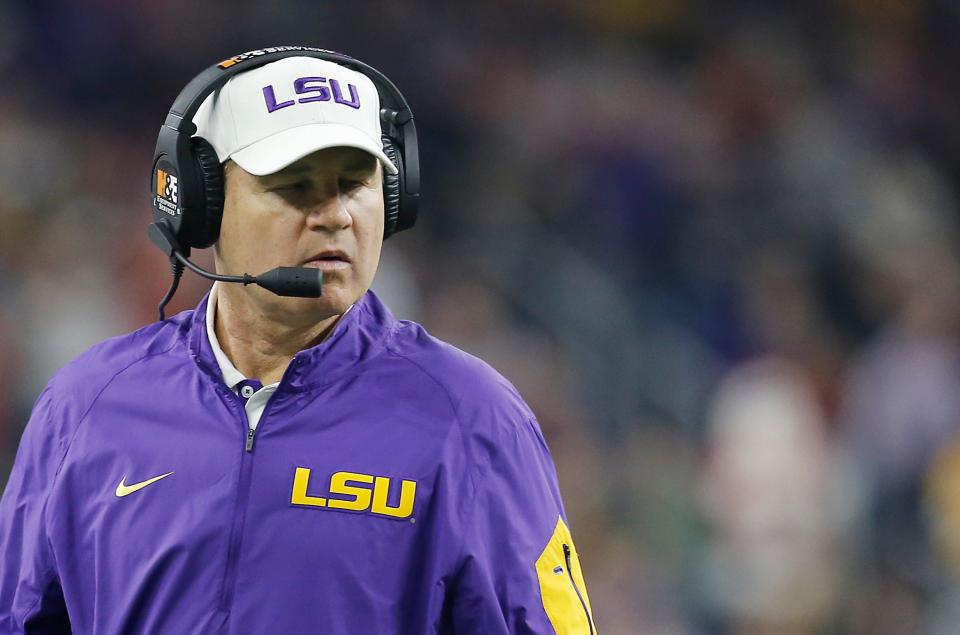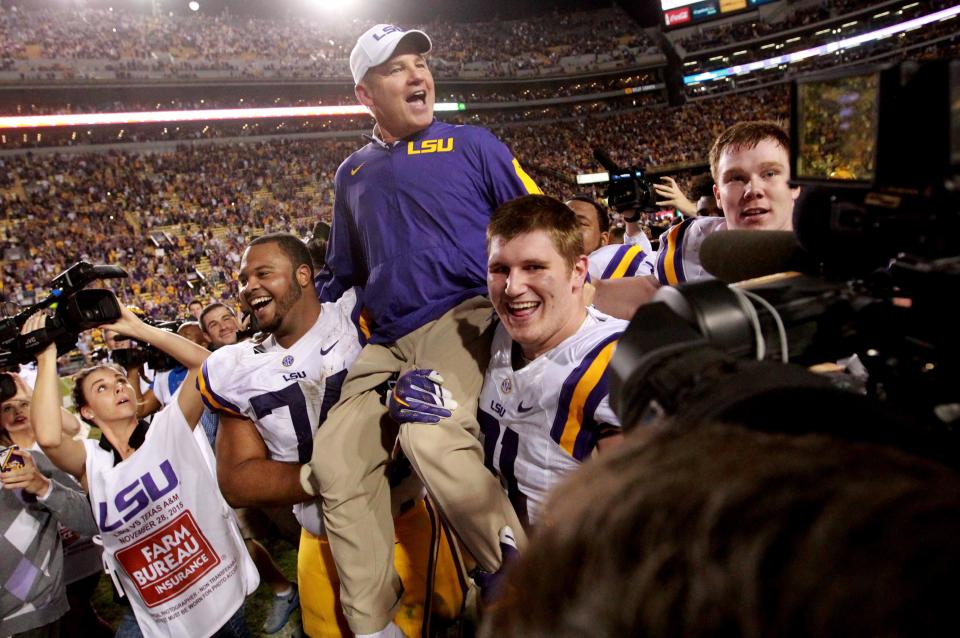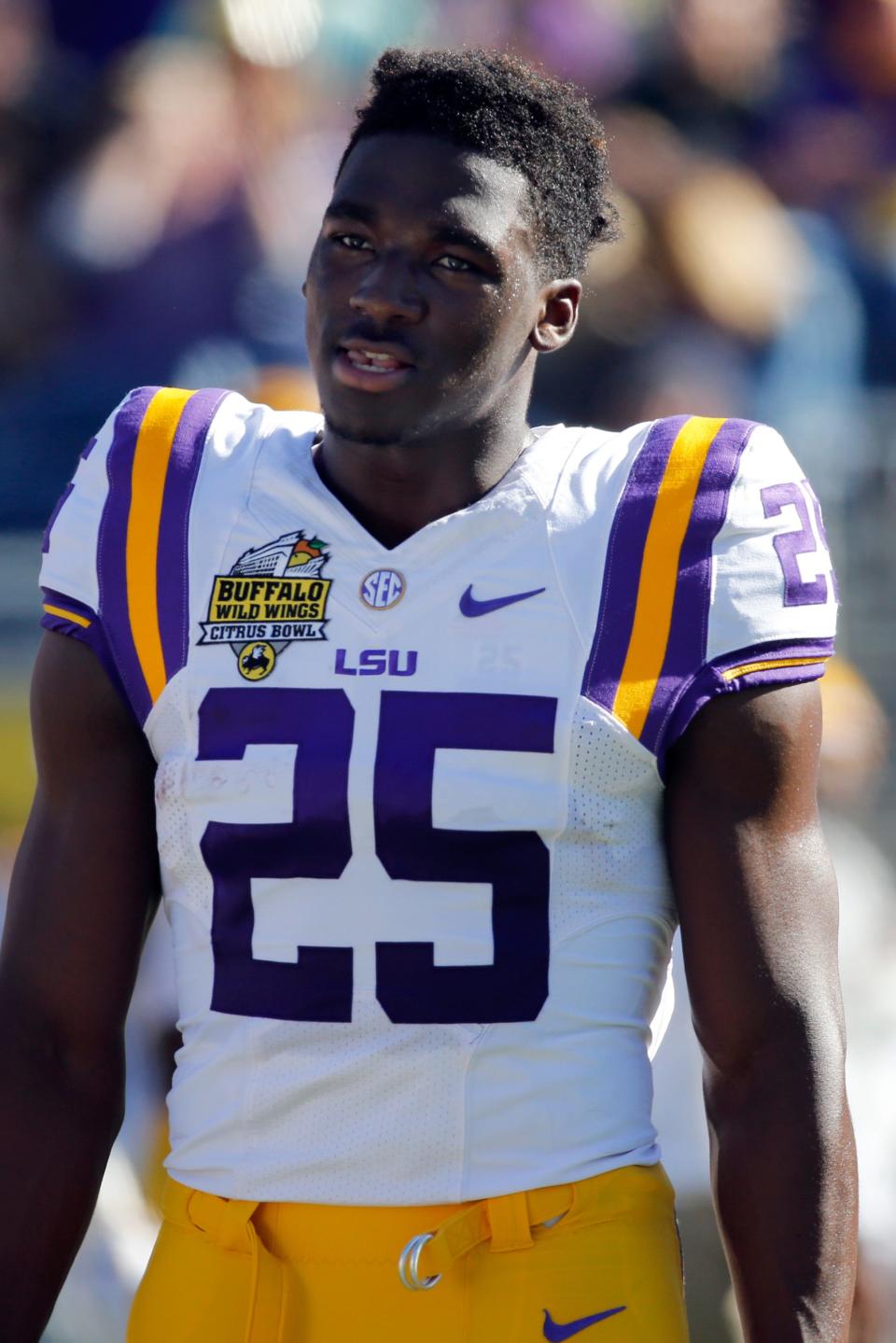LSU athletic administrator claims years of harassment and retaliation after reporting Les Miles
Top Louisiana State University officials conspired to cover up football coach Les Miles’ sexual harassment, then engaged in a years-long retaliation against the employee who reported it, the employee alleged in a series of federal and state lawsuits expected to be filed this week.
Sharon Lewis, LSU’s associate athletic director of football recruiting, named several senior officials who she claims tormented her, discriminated based on sex and race, underpaid her and contributed to LSU’s systemic failure to protect students and hold perpetrators accountable for gendered violence and harassment.
Attorneys for Lewis said they plan to file a federal Title IX lawsuit, a state whistleblower lawsuit, an Equal Employment Opportunity grievance and a civil lawsuit under the federal RICO statute, which is used to dismantle organized crime rings.
Defendants in the lawsuits include Executive Deputy Athletic Director Verge Ausberry and Senior Associate Athletic Director Miriam Segar – the only two LSU officials disciplined last month in connection with the school’s years-long, widespread mishandling of sexual misconduct allegations.
Those failures were detailed in a report by the law firm Husch Blackwell, which LSU hired to review its handling of such claims in response to reporting by USA TODAY.

Last month, LSU suspended Ausberry and Segar without pay for 30 days and 21 days, respectively – punishments decried by women state lawmakers and students as too lenient. Segar returned to work last week, and Ausberry returned Monday.
In an exclusive interview with USA TODAY, Lewis described a pattern of abusive treatment and retaliation by Miles, Ausberry, Segar, compliance director Bo Bahnsen and other athletics officials. The retaliation, she said, continues to this day.
Lewis said Miles harassed and undermined her for years, trying to sexualize the group of student workers she supervised. Ausberry verbally abused her, she said, and he and Segar lied to an LSU Title IX investigator to get her in trouble.
Lewis, the first Black woman football recruiting director in the Southeastern Conference, said she was denied pay raises and promotions, ridiculed in front of her co-workers and told to find another job when she complained. She suffered a mental breakdown, she said.
“They get to lie, and they get to admit that they lied, and come back to work,” she said on a Zoom call with USA TODAY, accompanied by her attorneys. “I mean, it’s about – we have to set a standard there, that’s all.”
In addition to Ausberry, Segar and Bahnsen, other defendants include current and former members of the LSU Board of Supervisors, the law firm Taylor Porter, former LSU President F. King Alexander and Athletic Director Scott Woodward, who Lewis said has a close personal relationship with Ausberry and refuses to meet directly with her despite being head of her department. Ausberry, Lewis said, called Woodward his “boy" in a conversation last year during which he said Woodward would not protect her.
A 19-year veteran of the football staff and former LSU track champion, Lewis said she has stayed in her position because she loves the school and wants to create paths for other women in football. She said she continues to endure abuse from colleagues, who have tried to push her out.
“The same people are here – the same people who were treating me hostilely from Day One of me reporting,” Lewis said. “It’s still a hostile work environment for me. I still feel panic. I still feel isolated. And I don’t feel protected.”
The claims in Lewis’ lawsuits are corroborated by several former employees interviewed by Husch Blackwell, as well as memos and letters Lewis and her attorney sent to LSU’s human resources office memorializing the alleged harassment, retaliation and discrimination she suffered over the years. USA TODAY reviewed copies of the documents.
LSU never investigated Lewis’ complaints, Husch Blackwell found.
LSU declined to comment on potential litigation. Ausberry also declined to speak about the allegations. Segar did not immediately respond to a request for comment. Peter Ginsberg, an attorney for Miles, denied all of Lewis’ allegations against his client and questioned her motives.
Larry English, one of three attorneys representing Lewis, said that by systemically covering up reports of sexual misconduct and retaliation, top LSU officials and board members engaged in a conspiracy to circumvent federal and state laws.
“This case is about how LSU values women and women of color,” English said. “There is a problem when you look at this case: Everybody who had power in this case was a man. When you have a university and a system where women are devalued, they are mistreated.”
Les Miles pressured Lewis
The harassment and retaliation against Lewis started within days of Miles’ arrival as LSU’s newly hired head football coach in January 2005, Lewis alleged in her lawsuit and in an interview with USA TODAY.
Lewis, who was hired in 2002, was in charge of coordinating travel, lodging, meals and meetings for recruits and their families during official visits to LSU. She managed a group of student workers who assisted with recruiting, including hosting recruits during campus visits.
Hostess groups, which were almost always all-women, were an under-the-radar but commonplace part of college football until 2004, when the NCAA took measures to rein them back after high-profile incidents at the University of Colorado and Arizona State. Hostesses said they had supplied alcohol and sex to recruits, and some said football players had raped them.
Although LSU’s hostess program – called Tiger Pride – was officially disbanded around that time, the sexualization of LSU’s football recruiting staff resumed almost immediately after Miles’ hiring, Lewis said.

Miles repeatedly pressured Lewis to replace Black student workers on her recruiting staff with blond women or light-skinned Black women whom he considered prettier, Lewis said. When she refused, she said, he directed others to get Lewis to comply with his demands. Her attempts to report his behavior fell on deaf ears, she said.
Among the incidents she described was a meeting on Miles’ second or third day on the job. Miles told a coach in the room that he preferred blondes, not brunettes, working in his office. He said it without looking at Lewis, even though she was right next to him, she said.
About a month later, according to Lewis, Miles said of a blond woman they hired, “Now she’s the face of recruiting.” Lewis perceived his comments as racist, she said.
Lewis said Miles came to her office and told her they had “too many fat girls, Black girls and ugly girls,” and they “look like a bad bowling team.” She said he described ugly girls as “a.m. girls” who should be relegated to office work, and “blondes with big boobs” as “p.m. girls” who should be at recruiting events for people to look at.
In November 2010, LSU hosted quarterback recruit Zach Mettenberger on an official visit. Miles needed a quarterback, and Mettenberger had just been kicked off the University of Georgia football team after he was accused of groping the breasts and buttocks of a student at a bar. Mettenberger pleaded guilty to counts of battery that May and was sentenced to a year of probation.
In a staff meeting after Mettenberger’s visit, Miles complained that LSU’s recruiting girls were ugly and that when he was head coach at Oklahoma State University, he interviewed and picked the girls himself. Miles didn’t realize Lewis was there, she said, until all the coaches looked at her. She said she felt shocked, embarrassed and isolated.
Miles pressured his staff to get Lewis to comply, she said. According to Lewis, then-running backs coach Frank Wilson and then-director of player personnel Sherman Morris instructed her to hire fewer Black girls or at least lighter-skinned Black girls to “get Coach Miles off my back.” Wilson and Morris met with Lewis’ colleagues, she said, and asked them to help influence Lewis “to do what Les Miles wanted."
Lewis reported all this to Ausberry, Bahnsen and other administrators, she said, but they seemed to take Miles’ side. Bahnsen “hinted that maybe it was time for me to look for another job,” Lewis said. Ausberry told her she used to hire prettier girls and should resume doing so, referring to a white woman she’d hired, Lewis said. He told her to focus more on her job and less on Miles’ comments and said she “should have taken the job at Alabama.”
“That is when the panic started to set in,” Lewis said, “because I realized they didn’t have my back.”
Bosses overruled Lewis' objections
After years of being rebuffed by Lewis, she said, Miles decided in early 2012 to start personally interviewing student workers in his office at night.
This plan, which was authorized by Ausberry, Bahnsen and director of football operations Sam Nader over Lewis’ objections, led to the sexual harassment of several of Lewis’ employees and triggered an internal investigative report that campus officials and board members sought to conceal, Lewis said.
It was, Lewis said, her “worst nightmare.”
Some of the women disclosed to Lewis that during the meetings, Miles asked them about their sex life, she said. One student said Miles asked her whether she was a virgin.
Then, around the same time that LSU negotiated a new, $4.3 million-per-year contract with Miles that made him the fourth-highest paid college football coach in the country, Miles’ behavior escalated.

In January 2013, a student came to Lewis and a colleague “very upset about something that happened when she was alone with Coach Miles” and wanted to confront Miles about it. The student, Lewis said, later told her that Miles “got on top of her in his office on his couch.”
During an ensuing confrontation with Miles, the student was “completely traumatized," had a “dead stare” and “kept saying over and over, ‘You know what you did to me,’” according to the Husch Blackwell report. Lewis, who was in the meeting, said it was very emotional, and Miles kept apologizing to the student for his actions.
Afterward, Lewis immediately notified Segar and later Ausberry. In a meeting with athletics human resources director Wendy Nall, Segar told Lewis she’d “take it from here” and dismissed her. Segar called Lewis and said the student “can no longer work in football” and recommended that she “be moved out of the building,” Lewis said.
Husch Blackwell found no records indicating the student’s complaint was “investigated in a matter consistent with then-University policy” and no evidence that the student was informed of her rights or provided supportive resources.
Then-Athletic Director Joe Alleva directed Miles to “refrain from contact with student workers” after the incident, the Husch Blackwell report says. He engaged law firm Taylor Porter to provide sexual harassment training to employees.
The next month, in February 2013, another student worker came to Lewis, reporting that Miles had made sexual advances toward her and sent her inappropriate text messages. Lewis said she notified Segar, Ausberry and Nall, who excluded Lewis from further meetings. Segar told Lewis she was “no longer to interview the girls when they come to me with complaints” and instead was “to just turn them over to her immediately” and have “no more involvement.”
Unbeknownst to Lewis, Segar and Alleva worked with Taylor Porter attorney Vicki Crochet to investigate the incident. The investigation report, which USA TODAY sued LSU for in January, shows that during Miles’ interview with the student, he told her he could help her career once she graduated and he could hire her to work for his personal business. He had her put his number in her phone under an alias and did the same for her.
Miles began texting the student, hired her to babysit his kids and invited her to a movie. When Miles picked her up in his car one day, the student said, he parked behind an athletic department building and kissed her twice.
Miles adamantly denied the allegations, saying he was simply mentoring young women and never made sexual advances.
Crochet’s investigation concluded that Miles’ conduct was inappropriate but did not rise to the level of prohibited sexual harassment under the law. The results of the inquiry were shared only with Alleva, Segar, then-LSU attorney Shelby McKenzie and three members of LSU’s Board of Supervisors: Garrett Danos, Stanley Jacobs and Robert Yarborough. The officials issued Miles a letter of reprimand, required he attend counseling and again ordered him not to contact student workers.
Husch Blackwell said the student’s report “was clearly not handled in a matter consistent with then-University policy,” and it “is not clear how the firm could have been neutral in the investigation.”
Despite having served as the investigator in the matter, Crochet continued to represent LSU in settlement negotiations with the student, attorney fee invoices obtained by USA TODAY show. The invoices show that Bahnsen, then-Senior Associate Athletic Director Herb Vincent, then-LSU general counsel William Jenkins, incoming President Alexander and members of the LSU board were kept apprised of the discussions.
Seeing Crochet’s report eight years later, Lewis said, made her “sick to my stomach.”
“Realizing how unprotected we were, and the lengths they went to hide all this, it just is – I’m reliving it every day, and it’s hard,” Lewis said.
Retaliation allegedly ramps up
After the Miles incidents, Lewis said, she was the target of repeated retaliation by the coach and other LSU athletic department employees that lasted years.
Even though Lewis resumed full control of the hiring process for student workers – and those workers were barred from working after hours, doing personal tasks for coaches or sitting in Miles’ area – Miles continued to undermine her, she said, intimidating her and openly trying to influence the hiring process.
Rather than stick up for her, she said, her colleagues tried to push her out.
In a meeting with Nader, Wilson and Morris, Miles confronted Lewis about the type of girls he wanted for a recruiting event. When she rejected his orders, she said, he kicked everyone out of the room and threatened her.

“He got in my face and said that if I was a coach and didn’t do what he said, he would punch him in his mother f------ face,” Lewis said. “I said, ‘I guess that you will just have to punch me in my mother f------ face.’”
Lewis reported this encounter to Nader, Wilson, Ausberry, Bahnsen and others, she said. Lewis said Nader responded by saying, “Next time, I need to just say what Coach Miles wanted me to say.”
On another occasion, Lewis said, she asked Miles why she’d been excluded from the raises that coaches and Nader had received. According to Lewis, Miles told her “it depended on how the girls look.” She told Ausberry, who told her she should look for another job. She complained to athletic department CFO Mark Ewing, who told her the decision was Miles’.
“I felt and feel it’s unfair to be judged not off of my work performance but from the look of the type of girl I hired to please Coach Miles,” Lewis said. “I felt doomed.”
Lewis said Miles harassed her almost weekly, to the point she would hide under her desk if she heard him coming.

Miles demanded that a Black student worker leave the building because she was “ugly.” On another occasion, Miles ordered Lewis to fire a student “because he looked gay,” she said. The student was the nephew of Ya’El Lofton, an assistant to Miles. When Lewis said no, she said, he became irate and stood in front of the doorway for two to three minutes, glaring at her.
Lewis reported this incident to Ausberry, Segar, Bahnsen and others, she said. No one seemed to care that she was under attack, Lewis said. Instead, they told her to look for another job.
Lewis suffered a “mental breakdown” as a result of the abuse, she said. She wasn’t sleeping, lost weight, and her hair started falling out, she said. Anxious and depressed, she reached out to Segar, whom she understood to be her Title IX contact, for help. She told Segar she felt she was being retaliated against for reporting Miles. Lewis disclosed that a different football coach was sexually harassing her.
Segar set her up with a therapist, paid for by LSU. The alleged retaliation, Husch Blackwell said in its report, “was never investigated by the leadership of the University.”
Abuse continues, Lewis says
Although LSU fired Miles in September 2016 after a string of losses, many of the administrators who took his side stayed. They continued to retaliate against Lewis, she said, long after Miles left.
Lewis said Ausberry has been particularly hostile. He has screamed at her in meetings, berated her and belittled her, she said. Several employees corroborated these claims to Husch Blackwell, saying they’d witnessed him “hollering” and “screaming” at Lewis repeatedly over the course of the past several years.
When Lewis ran for president of the National L Club, LSU’s alumni association for athletes, Ausberry instructed some of the club’s board members not to vote for her, she said. After she won, she said, Ausberry held a meeting with senior staff members and told them not to grant her all the powers of the presidency.
Ausberry called Lewis a “stupid incompetent b----” on a phone call with Wilson, unaware that Wilson had him on speakerphone and that Lewis was in the room, she said. Lewis said she reported Ausberry’s comment to Segar, who told her that she and Ausberry were “like brother and sister” and that was just how they spoke to each other.
“He is not my brother but my supervisor,” Lewis said, “and he should not be allowed to treat me this way.”
Lewis said she asked Segar to talk to Alleva about it, which Segar did. Rather than help her, Segar and Alleva made a joke about it, Lewis said. Segar asked Lewis to meet for coffee and told her she’d probably be happier working somewhere else.
In a meeting, according to Lewis, Segar sarcastically commented that she had to watch what she said around Lewis, because she reported everything.
Lewis said she indeed reported every Title IX issue to Segar, as she’d been trained. Alleva issued directives to staff to report all such complaints to Segar, instead of directly to the Title IX office, as LSU policy required. Segar verbally reinforced that policy to Lewis on several occasions, Lewis said.
Lewis said she did not learn until later that when she reported information to Segar, Segar did not always forward the information to the Title IX office. Instead, Lewis said, Segar decided on her own that certain allegations “weren’t Title IX issues” or didn’t warrant an investigation.
Such was the case, Lewis said, when she reported dating violence allegations against then-LSU wide receiver Drake Davis to Segar and Ausberry in 2016.

Neither Segar nor Ausberry took that information to the school’s Title IX office. Lewis didn’t find out about that until two years later, when Davis’ victim, Calise Richardson, filed a complaint with the Title IX office saying LSU never investigated her claims.
Segar and Ausberry denied to the school’s Title IX investigator that Lewis shared the information with them. Segar told the investigator that Lewis never reported any Title IX issues to her, the investigation report shows. LSU found Lewis responsible for violating policy by failing to report the information to the Title IX coordinator.
Segar told Husch Blackwell that Lewis had, in fact, reported many Title IX issues to her, and that the investigator must have misquoted her in his report.
Lewis appealed the Title IX decision and continued fighting the ruling with LSU’s human resources office even after her appeal was denied. As part of that effort, Lewis and her attorney sent Jennifer Normand, LSU’s human resources director, letters detailing the abuse and retaliation she said she’d endured.
Normand agreed to remove the disciplinary action from her file, but LSU never investigated her complaints, said Lewis and the Husch Blackwell report. Husch Blackwell found no one at LSU except Lewis has been disciplined for failing to report a Title IX offense.
Richardson told USA TODAY that although Lewis may have been retaliated against, she should be held accountable for the way she treated her. Richardson said that in 2016, Lewis and her assistant, Keava Soil-Cormier, laughed at her when she told them she was scared of Davis and told her she could go to the police if she wanted to ruin his life.
Lewis denied laughing at Richardson and said she reported “everything” to Segar and Ausberry. Soil-Cormier previously declined to comment.
“If what Sharon says is true, then I support her pursuit in fighting for her own justice,” Richardson said. “On the other side of it, I deserve my own justice in the form of her being held accountable for her actions towards me. One does not cancel out the other.”
Lewis filed Title IX complaints against Segar and Ausberry for failing to report Title IX complaints. Nothing came of those reports, Lewis said, except more retaliation.
Lewis asked Ausberry in a meeting in fall 2020 why she’d been denied pay raises and promotions and why he’d never stood up for her. According to Lewis, Ausberry responded, “Because you turned me in.”
Ausberry previously told Lewis twice that she “won’t get promoted because I say Title IX too much” and because “people in administration were scared of me because I reported stuff.” In August, LSU promoted her from assistant athletic director to associate athletic director, Lewis said – a designation that came with no pay raise.
In 2019, LSU doubled Ausberry's annual salary to more than $500,000.
Ausberry reminded Lewis in October that Woodward, whom LSU had hired as the athletic director in 2019, was his “boy” and that he would never promote her and “never meet with me.” Woodward still hasn’t met with her after nearly two years since his hiring, Lewis said.
“That’s why I say the retaliation is even up to now,” Lewis said.
Lewis has wanted to quit, she said, but a bigger part of her wants to stay. She loves LSU, she said.
“But the people – the people didn't do right, and didn't do what they were supposed to do in terms of protecting who we are as people,” Lewis said.
“They protected the brand.”
This article originally appeared on USA TODAY: LSU official claims harassment, retaliation after Les Miles scandal

 money
money 